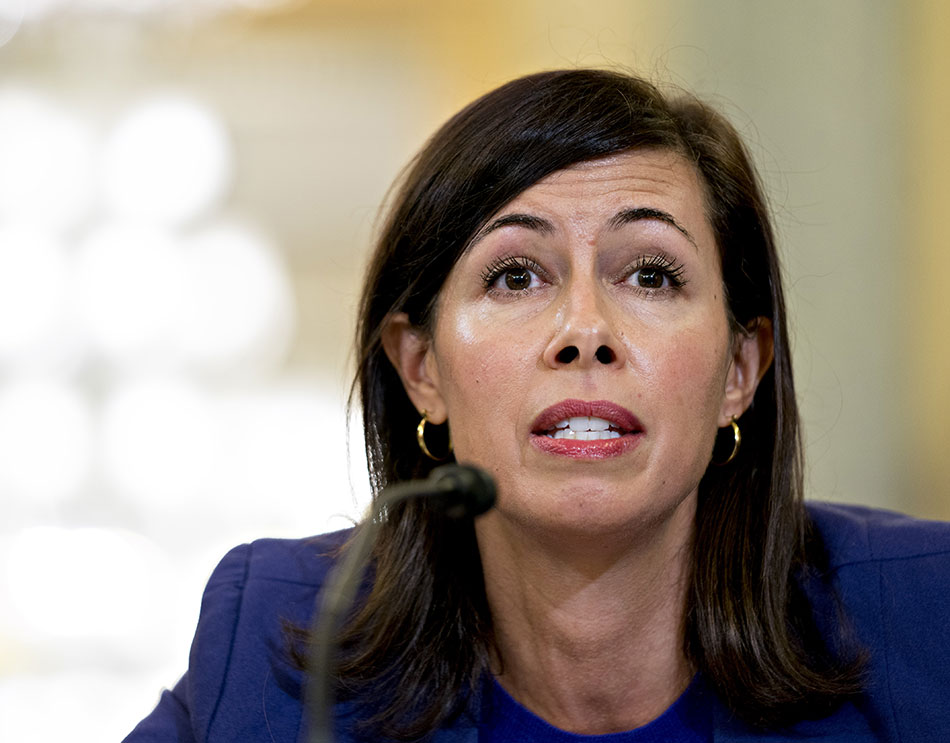Jessica Rosenworcel Takes FCC Gavel
New Democratic chair looking for ‘way forward’ on net neutrality despite 2-2 agency status

The smarter way to stay on top of the multichannel video marketplace. Sign up below.
You are now subscribed
Your newsletter sign-up was successful
Acting Federal Communications Commission chairwoman Jessica Rosenworcel has sent a clear signal that she is still a big fan of network neutrality rules, and that she is no fan of the Trump administration petition to the agency to regulate social media using Section 230 of the Communications Decency Act of 1996.
That was made known as she presided over her first public meeting as acting chair, wielding the gavel from home and saying there was much on the FCC’s plate.
The commission’s being currently at a 2-2 political tie, she pointed out, will obviously have an impact on the timing of big-ticket items.
Asked about those two issues and how she planned to proceed, Rosenworcel said she had made it clear that as a commissioner she did not favor commission action on the petition from the National Telecommunications & Information Administration asking the agency to cut back on internet service providers’ protections under Section 230.
ALSO READ: ISPs Prepare for Flood of Broadband Billions
“I do not believe the FCC should be the president’s speech police,” she said. While she said she had no other insights on the petition, filed by the Trump administration in July 2020, clearly it is not getting traction if she remains chairwoman.
On that topic, asked if she anticipated having the “acting” removed from her title, she said she would leave that up to the White House.
The smarter way to stay on top of the multichannel video marketplace. Sign up below.
With respect to net neutrality, Rosenworcel said the record reflected that she supported net neutrality — she voted against the Restoring Internet Freedom order that eliminated the rules against blocking, throttling and paid prioritization — and that the FCC was “assessing right now what the best way forward is, conscious of the composition of the commission.” Most on both sides argue the best way would be for Congress to clearly establish exactly what the FCC’s authority over net neutrality is.
Rosenworcel was asked about her plan for a top-to-bottom review of the agency, but suggested it was regular procedure for anyone taking over an agency to review issues in every bureau to see if they need a revamp.
One signal Rosenworcel has clearly sent is that there needs to be more intra- and inter-agency cooperation, communication and coordination, including around national security reviews of communications companies and tech.
EBB Must Flow
One big-ticket item that can’t wait is the FCC’s standing up of the $3.2 billion Emergency Broadband Connectivity Fund (EBB).
The commission has until next week to come up with a framework for handing out that money. It will be based on the Lifeline subsidy program already in place, but unlike Lifeline it is a six-month program using that $3.2 billion congressional allocation rather than an ongoing subsidy funded by fees on telecom bills.
At last week’s hearing, Republican commissioner Brendan Carr very publicly said he thought priority should be given to remote learning, an issue right in Rosenworcel’s wheelhouse. But she signaled the FCC was bound by the language of the legislation, which cited multiple constituencies of equal eligibility.
Contributing editor John Eggerton has been an editor and/or writer on media regulation, legislation and policy for over four decades, including covering the FCC, FTC, Congress, the major media trade associations, and the federal courts. In addition to Multichannel News and Broadcasting + Cable, his work has appeared in Radio World, TV Technology, TV Fax, This Week in Consumer Electronics, Variety and the Encyclopedia Britannica.

